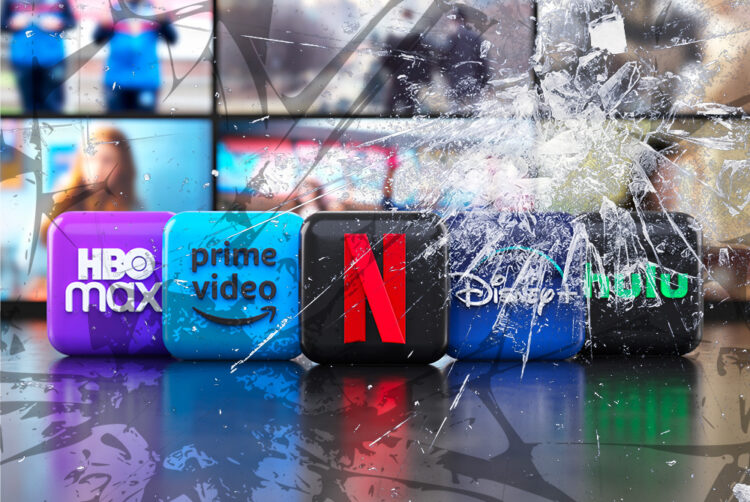Streaming TV’s blind quest to follow Big Tech is doomed

Opinion
Let’s fix the broken business model of streaming to ensure that creativity and commerciality can thrive together and entertain us with the best content possible.
Several years ago, I worked at the BBC under its visionary boss Greg Dyke who felt the creativity of the corporation was being suffocated by bureaucratic inertia. One of his solutions was yellow cards bearing the words “cut the crap, make it happen”, which staff were urged to whip out whenever they felt a meeting was slipping into pointlessness.
There’s a reason why we’re not all waving “cut the crap” cards on our Zoom/Teams calls today: as much as creatives would hate to admit it, it’s the business-minded, sales-aware keeping their organisation running and allowing creativity to flourish. It’s thanks to their commercial nous, negotiation skills and creativity in divining new sources of revenue that businesses are able to invest more money in training and developing talent, commissioning new stars and even focusing on non-profit endeavours.
However, when creativity and commercials lose respect for each other, entertainment suffers. It’s something we’re likely to see over the next few months if the Sag-Aftra Hollywood strike continues. Settle down for an evening to watch Netflix, Amazon Prime Video or Disney+, and you could find the schedules full of reruns and reality TV; a far cry from the prestige content we’ve been accustomed to in recent years. The Venice and Toronto film festivals will be devoid of the breakout hits that usually wow us until Christmas. Shows that have been green-lit will never be made; the likes of HBO and Hulu have already purged the entire series for their tax savings.
Duff economics of streaming
Aside from AI (another conversation), one of the reasons Hollywood is striking is the issue of streamers paying much less in residuals — payments received when a show goes into reruns and syndication – than broadcast TV. These streamers embarked on some of the biggest spending sprees in the entertainment industry, creating more series, more jobs, some much-needed pledges at making the industry more diverse, and some standout TV, from Stranger Things to The Crown.
But following the Big Tech business model (companies which have massive on-paper wealth and shareholder growth), rather than the old-fashioned principle of revenues and profits, could be their ruin. Their streaming shows are massive hits, but are they making money?
The combined cost of streaming services like Netflix and Disney+ is now more expensive than traditional cable television, while Wall Street Journal analysis points to how the average cost of watching an ad-free streaming service has gone up by nearly 25% in about a year. It also points out that entertainment giants are betting that customers will either pay up or switch to cheaper (but much more lucrative) ad-supported streaming plans.
The filmmaker Steven Soderbergh recently compared the streaming subscription model to the let’s-take-a-flutter-on-the-horses credo of crypto. He’s entirely right. The problem is the rest of Hollywood — the once-titanic networks and studios — have followed this model, turning themselves into apps and jettisoning previously profitable revenue streams. Thanks to the duff economics of streaming, we have an entertainment Sahara/tumbleweed facing us this autumn.
While streamers and studios alike skid towards a future of consolidations and cutbacks (Warner Bros’ Discovery posted $7bn in losses last year; Paramount is cutting 25% of its workforce) or scratch heads wondering what to do next (what will Netflix do with the 100 million people borrowing passwords from friends/family? — if you want to ‘add’ another account in the US, you have to pay more…), the century-old industry of cinema and box-office-receipts is seemingly in rude health:Oppenheimer globally generated $728m and Barbie made history with $1.28bn at the worldwide box office.
Fix the broken model first
Oppenheimer director Christopher Nolan recently told the Financial Times that creatives should be better compensated, with studios and tech companies using “streaming as a loophole to essentially not pay residuals and not pay the true cost of production.”
Yes, these residuals should be paid, but Hollywood needs a better, more transparent method of financially rewarding creative success. Should it be based on metrics? Digital measurement systems are notoriously hard to validate, plus streamers will need to be less reluctant to reveal data about who watches their shows.
Maybe true creativity will eventually triumph, as it always has done. One of the writers of Hulu’s critically acclaimed The Bear told the media he made so little money, had a negative bank balance and wore a bow-tie bought on credit the week his team won a best comedy award. Even though they might not be remunerated now, I really hope this writer — and the creatives who worked with Nolan on Oppenheimer — will receive future, better-paid work because they’ve got these names on their CV. Yet, none of this will happen unless we fix the broken business model of streaming first.
Creative talent and achievement should always be celebrated. But so should the ‘suits’ with their spreadsheets and their salespeople — they get things done. The streamers in their blind quest to follow Big Tech, have lost sight of this.
Both streamers and legacy media alike will need their skills like never before. To paraphrase my former BBC boss, it’s time to cut the crap and make business happen once again.
 Phil Fearnley is group CEO of House 337, an integrated creative agency, after a combined 10 years at the BBC where he helped launch the iPlayer in 2007, create the world’s first fully digital Olympic Games for London 2012, and grow Future Media’s Salford team from zero to 500 in just under three years.
Phil Fearnley is group CEO of House 337, an integrated creative agency, after a combined 10 years at the BBC where he helped launch the iPlayer in 2007, create the world’s first fully digital Olympic Games for London 2012, and grow Future Media’s Salford team from zero to 500 in just under three years.




